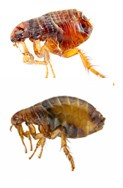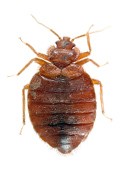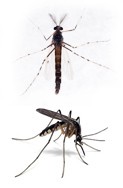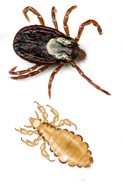Parasites of Man and Animals
Fleas

There are many different species of fleas, each one specializing in a particular host. These include
1. Cat flea
2. Bird flea
One common feature they share is that they all feed on the blood of mammals and birds.
Although each flea species has evolved to feed on the blood of a particular host, some will readily feed from another host if the preferred host is not present.
For example, in the absence of a cat, the cat flea will feed on human blood. The same is also true of the dog flea, the hedgehog flea and the bird flea.
The flea, in common with most insects, lays eggs.
For these eggs to properly develop inside the female, she needs a blood feed.
She lays several hundred eggs after each meal, and deposits them in areas such as birds’ nests, animal bedding or at wall floor junctions where animal hair has accumulated.
Treatments for flea infestations should include cleaning of the infested areas to remove harborage sites, treatment of any infested animals by a veterinary insecticide and the careful application of residual insecticides by a professional pest controller.
Bed Bugs

Bed bugs should not be confused with bed mites.
Bed mites are present in nearly all homes as they feed on dead skin.
Bed bugs are quite different and a lot more unpleasant.
Bed bugs feed on blood, usually human blood.
They are mostly nocturnal and tend to live close to their human hosts.
They are most commonly found on and around beds, headboards, mattresses and on bedroom furniture, but can be found behind light fittings, inside picture frames and under carpets at wall floor junctions.
They emerge at night to feed from their hosts, piercing the skin with their needle like mouthparts and drawing up blood.
The female bed bug can lay up to 400 eggs throughout her lifetime, depositing them close to the host.
Due to the vast array of harborages present in the modern or hotel room, bed bug eradication can be a long drawn out process.
Treatments using over the counter insecticides are rarely successful and professional help should always be sought.
Midges and Mosquitoes

Midges andmosquitoes have been around for many millions of years.
They have evolved to feed on the blood of warm blooded animals, including humans.
Using their piercing mouthparts, they puncture the skin to access the protein rich blood below.
In some species, females cannot develop their eggs properly without this blood feed.
Midges are prevalent in the UK, particularly noticeable are the several species found on the West Coast of Scotland where the relatively warm conditions allied to the high levels of rainfall, mean numbers can explode in summer months.
Many methods to help in the control of midges have been developed over the years.
These range from window screens to liquid repellents, all with varied levels of success.
Commercial midge muncher machines have become popular amongst operators of hotels and pubs where midges can have a detrimental effect on trade.
These machines work by mimicking large mammals such as cattle to draw biting midges away from areas where humans congregate outside such as beer gardens and balconies.
If you would like more information, please do not hesitate to contact us.
Ticks and Lice

There are many varied species of ticks and lice in the UK.
Most species will actively seek out a suitable host species looking for a blood feed
Lice, be they of the dog, cat or human variety, can be spread by various methods, but mostly by contact with an infested individual.
Medical advice should be sought in cases of human infestation, and veterinary help should be sought for cases involving animals.
Ticks are relatively common in the UK and can often be found attached to human and animal hosts.
They have been known to transmit Lymes Disease to humans, although the UK strain of this disease is said to be weaker and patients treated quickly with suitable antibiotics, usually make a full recovery.
In the case of ticks and lice infestations, medical or veterinary advice should be sought in the first instance, with pest controllers providing residual insecticidal treatments as a precaution.





